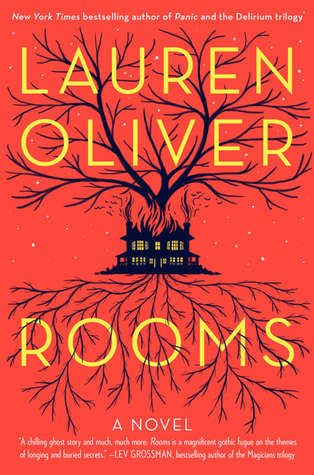 Rooms
Roomsby Lauren Oliver
reviewed by Madeleine Hara
Written by Lauren Oliver, the eerie novel: Rooms told by several perspectives, including the omniscient views of three ghosts, gives insight to each problematic family that lived or lives in the house. Rooms differs from other novels because of its division into sections based on the events occurring in each room of the house over the course of four generations. The ghosts: Alice, Sandra, and Eva, all victims of tragic deaths, try to forget the grim memories of their lives, but cannot escape memories, “thick as mud” that “rise up,” “overwhelm,” and “suck you down and freeze you where you stand” (Lauren Oliver 140).
Richard Walker, a man unable to care for his family, dies resulting in the return of the remaining Walker family: his jealous, alcoholic ex-wife Caroline, suicidal son Trenton, angry daughter Minna, and Minna’s young daughter Amy. Unable to escape the house’s history, each struggles to accept themselves and their pasts. Watching the inevitable destruction of the Walkers, the two ghosts, Alice and Sandra bicker and attempt to abandon the painful thoughts of their own pasts, each regretting decisions of love and becoming “dry, dusty, throwaway women” (77). The ghosts communicate through “creaks and whispers” that the Walkers “simply don’t understand” (2), until a new ghost, Eva begins to talk with Trenton, leading to the surprising discovery that Trenton has become able to hear them amid the “holes, the dark spaces” that “seemed to always be…eating up” (161) at the ghost’s features. Eva and Trenton’s relationship only leads to more disorder as each Walker tries to explore the contents, both literal and figurative, of each room.
I did not begin to enjoy Rooms until halfway through reading it. The first half explains the basis of the knowledge needed, but lacks action. The second half makes the important connections that form the story and contains the drama and excitement that keeps the reader interested. Rooms’ unusual story and unique reading left me wanting more. I would recommend Rooms to a reader able to handle some mature content, and a lover of sci-fi. Secrets, discovery, and acceptance play monumental roles in the development of the story and its characters. Oliver’s creativity is expressed through making the connection between “people” and “houses” because although “you could walk through their rooms and touch the objects hidden in their corners”, “the structure” remains “invisible” (277). Full of undiscovered mysteries, Rooms explores humans’ inability to disregard their mistakes and their need to have omniscient knowledge.
No comments:
Post a Comment